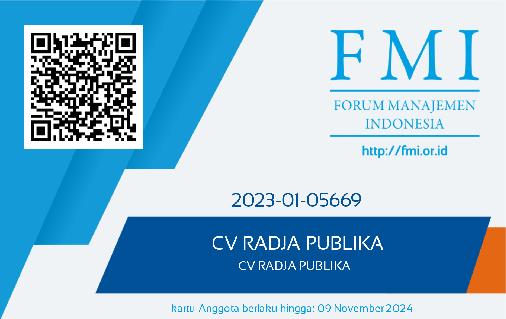THE DETERMINANTS OF E-BUDGETING IMPLEMENTATION IN INDONESIA: A SYSTEMATIC LITERATURE REVIEW
DOI:
https://doi.org/10.54443/jaruda.v2i2.104Keywords:
Determinants, E-Budgeting, IndonesiaAbstract
This study conducts a comprehensive analysis of the factors that influence the implementation of E-Budgeting in Indonesia. Furthermore, the research highlights the significance of modernization in the management of public budgets and the government's endeavors to enhance efficiency and transparency by adopting E-Budgeting. The primary goal is to ascertain the pivotal factors that impact the effective execution of this system. The employed approach is Systematic Literature Review, which consolidates findings from diverse reputable sources. The research findings and analysis indicate that the factors influencing the implementation of E-Budgeting encompass a range of technical, political, social, and cultural determinants. The primary factors that influence implementation are resources, political backing, inter-agency coordination, and adherence to regulations. Furthermore, organizational culture, institutional capacity, stakeholder participation, and ongoing evaluation also exert significant influence. Implementing E-Budgeting has the effect of enhancing efficiency, transparency, and accountability in the management of public budgets. The research concludes that the adoption of E-Budgeting in Indonesia represents a favorable stride towards enhanced efficiency and transparency in budget administration. However, in order to attain complete success, it is imperative to give significant consideration to the determinant factors that have been mentioned. Implementing E-Budgeting in Indonesia can yield significant advantages in promoting sustainable economic growth and enhancing governance by effectively addressing these challenges.
References
Adila, RN, & Dahtiah, N. (2020). Evaluation of the Implementation of the E-Budgeting System with the Human Organization Technology Fit Model Approach in the West Java Provincial Government. Proceedings of the 11th Industrial Research Workshop and National Seminar Bandung, 26–27.
Andriyanto, D., Baridwan, Z., & Subekti, I. (2019). Antecedents of E-Budgeting Behavior: The Case of Village Financial Information Systems in Banyuwangi, Indonesia. Journal of Accounting and Business Dynamics, 6(2), 151–170. https://doi.org/10.24815/jdab.v6i2.13938
A'yun, LQ, & Hartaman, N. (2021). Evaluation of E-Budgeting Implementation in Budget Planning in Maros Regency. Journal of Government and Political Issues, 1(2), 65–72. https://doi.org/10.53341/jgpi.v1i2.22.
Adila, RN, & Dahtiah, N. (2020). Evaluation of the Implementation of the E-Budgeting System with the Human Organization Technology Fit Model Approach in the West Java Provincial Government. Proceedings of the 11th Industrial Research Workshop and National Seminar Bandung, 26–27.
Andriyanto, D., Baridwan, Z., & Subekti, I. (2019). Antecedents of E-Budgeting Behavior: The Case of Village Financial Information Systems in Banyuwangi, Indonesia. Journal of Accounting and Business Dynamics, 6(2), 151–170. https://doi.org/10.24815/jdab.v6i2.13938
A'yun, LQ, & Hartaman, N. (2021). Evaluation of E-Budgeting Implementation in Budget Planning in Maros Regency. Journal of Government and Political Issues, 1(2), 65–72. https://doi.org/10.53341/jgpi.v1i2.22
Gunawan, DR (2019). Implementation of the E-Budgeting System on Public Financial Transparency and Accountability (Study on the Surabaya City Government). Accounting journal. http://journal.unesa.ac.id/index.php/aj
Han, K. T., & Lin, J. K. (2023). Empirical and quantitative studies of Feng Shui: A systematic review (PRISMA 2009 item 1). In Heliyon (Vol. 9, Issue 9). Elsevier Ltd. https://doi.org/10.1016/j.heliyon.2023.e19532
Julianty, AF (2021). Analysis of the Implementation of E Budgeting in Supporting Transparency in the Surakarta City Government. Accounting journal.
Ketut, NLEK, & Gusti, IPA (2022). Analysis of the Implementation of E-Budgeting Using the Cipp Model (Context, Input, Process, and Product) and its Impact on Public Financial Transparency and Accountability in SKPD Karangasem Regency. Accounting Student Scientific Journal) Ganesha Education University, 13(03).
Khoirunnisak, R., Arishanti, D., & Vebrianti, DD (2017). Implementation of E-Budgeting by the Surabaya City Government in Achieving Good Governance. Proceedings of the National Seminar and Call for Papers on Economics and Business, 249–256.
Nasution, DAD, & Rizqy Ramadhan, P. (2019). The Influence of E-Budgeting Implementation on Regional Financial Transparency in Indonesia. E-Journal of Accounting, 669. https://doi.org/10.24843/eja.2019.v28.i01.p26
Permatasari, O., & Biduri, S. (2021). Implementation of E-Budgeting in the Era of the COVID-19 Pandemic at the Regional Secretariat of Sidoarjo Regency. Academia Open, 4. https://doi.org/10.21070/acopen.4.2021.2069
Program, RJ, D4, S., Government, AM, Bandung, PN, & Akuntansi, J. (2020). Implementation of Policies and Management Control Systems of E-Budgeting in Realizing Good Governance (Case Study in Bandung City Government) Implementation of Policies and Management Control Systems of E-Budgeting in Realizing Good Governance (Case Study in Bandung City Government) Neneng Dahtiah. Indonesian Accounting Research Journal, 1(1), 162–172.
Zahri, RM, & Kusumastuti, DA (2020). Determinants of User Perception, User Satisfaction and Successful Implementation of E-Budgeting in the Surakarta City Government. Owner, 4(1), 240. https://doi.org/10.33395/owner.v4i1.221
Zhu, M., Sari, A., & Lee, MM (2018). A systematic review of research methods and topics of the empirical MOOC literature (2014–2016). Internet and Higher Education, 37, 31–39. https://doi.org/10.1016/j.iheduc.2018.01.002
Downloads
Published
How to Cite
Issue
Section
License
Copyright (c) 2023 Bambang Subiyanto, Syamsudin, Khairul Saleh L. Tobing, Kumba Digdowiseiso, Norakma Abd Majid

This work is licensed under a Creative Commons Attribution 4.0 International License.
























